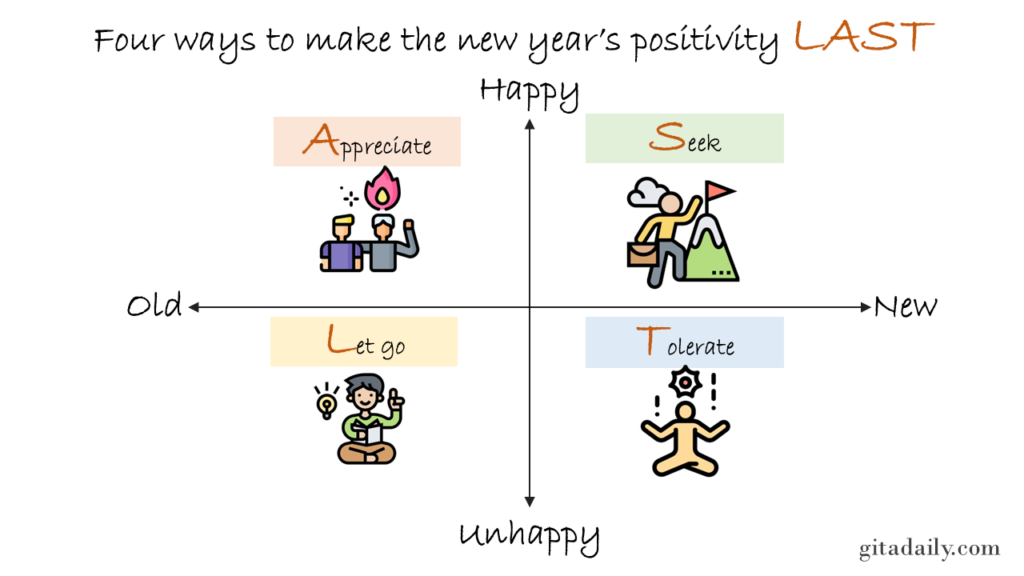Wish you a very happy New Year!
Normally, at such times, we make resolutions, and that’s very important. At the same time, today, I’d like to propose a more holistic approach by which the positivity of the New Year can last.
Consider a four-quadrant diagram:
The y-axis represents happiness (positive) and unhappiness (negative).
The x-axis represents newness (positive) and oldness (negative).
Using the acronym LAST:
L: Let go of what is old and unhappy.
A: Appreciate what is old and happy.
S: Seek what will be new and happy.
T: Tolerate what may be new and unhappy.
Let’s explore these quadrants one by one.
1. Let go of what is old and unhappy
In the past year, some bad things may have happened—perhaps a relationship went south, or a situation became irreparable. We need to let go. We don’t have to let those memories replay endlessly. If there’s something to learn, we can learn it, but after that, let go. The Bhagavad-Gita (18.35) emphasizes avoiding self-defeating thought patterns such as lamenting or resenting.
2. Appreciate what is old and happy
Reflect on the good in the past year. Maybe we discovered a new ability or learned a new skill. We can be grateful for the opportunities we received and appreciate how we rose to those occasions. The Bhagavad-Gita (16.1) highlights that satisfaction is not just an emotion—it’s a decision. By consciously focusing on what is right in our life, we can appreciate it and build on it.
3. Seek what will be new and happy
This is where resolutions come in. Let us determine how to better tap into the opportunities that the New Year brings. If we’re hoping for something positive to work out, we need to solidify our determination. The Bhagavad-Gita (6.25) states that intelligence sustained by conviction enables us to persist in our endeavors. Let us write down our resolutions and, by studying the Gita’s wisdom, appreciate how Krishna wants us to have a far brighter future.
4. Tolerate what may be new and unhappy
As with every year, unexpected, undesirable, or unfortunate events may occur. The key is to tolerate them. The Bhagavad-Gita (2.14) reminds us that everything that comes will pass. Let’s not get over-agitated or hyperventilate about setbacks. With a higher vision—that we are parts of Krishna and He has a plan for us—we can focus more on His plan than on our immediate pleasures or displeasures. This perspective can help us not just tolerate but transcend negativity.

By filling our consciousness with something stimulating and fulfilling, we can leave no room for negativity.
Let’s make our New Year positivity LAST by:
Letting go of what is old and unhappy.
Appreciating what is old and happy.
Seeking what will be new and happy.
Tolerating what may be new and unhappy.
***
17.16 And satisfaction, simplicity, gravity, self-control and purification of one’s existence are the austerities of the mind.


Leave A Comment